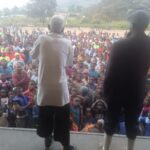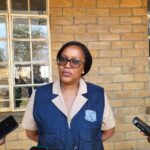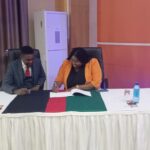15 MPs ditch People’s Party fearing Section 65
Published on August 24, 2012 at 5:17 AM by FACE OF MALAWI
Up to 15 Members of Parliament (MPs) have so far abandoned ruling People’s Party (PP) and returned to the parties that sponsored them to Parliament, most of them from the former ruling party the DPP.
PP has reacted angrily to their defections, saying the MPs had ulterior motives.
The MPs’ return to their mother parties, especially Democratic Progressive Party (DPP), also coincides with mounting pressure on Speaker of Parliament Henry Chimunthu Banda to crack his whip and apply Section 65 on crossing the floor.
Just two weeks ago, five MPs from Ntcheu — Luscious Kanyumba of Bwanje South Constituency, Steve Kamwendo of Bwanje North, Damson Chimalira of Ntcheu South, Everton Chimulirenji of Ntcheu North East and Assani Lipande of Ntcheu North — quit PP and rejoined DPP.
Other MPs who have ditched PP include United Democratic Front’s (UDF) Yaumi Mpaweni of Balaka Central East, DPP’s Bauleni Manna of Dowa, Bofomo Immanuel Nyirenda of Mzimba Luwerezi—who defected three times to PP, Yunus Mussa of Zomba Central and Rabson Chihaula Shaba of Mzimba South East.
Earlier on, the following legislators: Otria Moyo Jere of Kasungu West, Herbert Bimphi of Ntchisi North and Geoffrey Mbuzi of Ntchisi North East, Fredrick Kamwangala of Lilongwe North West and George Namatumbo of Chiradzulu West quit PP and returned to DPP.
Bofomo Nyirenda said yesterday the sudden death of president Bingu wa Mutharika confused many MPs including him and he had decided to go back to DPP because he felt it was morally right to do so after things have normalised.
During the 2009 general elections, the DPP amassed 114 seats, Malawi Congress Party 26, UDF 17, Alliance for Democracy 1, Maravi People’s Party 1, Malawi Forum for Unity and Development 1 and 32 independents.
Most of the MPs dumped DPP in the euphoria of President Joyce Banda’s ascendancy to power, some even before the DPP founder the late president Bingu wa Mutharika was buried at Ndata in Thyolo.
Reacting to the defections on Monday, PP Secretary General Henry Chibwana lashed out at the returnees, saying they had ulterior motives and their departure was good for PP.
“This is good because we think those who came but have gone back to their respective parties had ulterior motives for joining the party which the PP perhaps has not been able to fulfil,” Chibwana said.
He, however, could not elaborate on what ulterior motives the defectors had.
“I don’t want to speculate defectors fear that their seats could be declared vacant should they remain in PP, Dausi objected.
“I don’t think so. They have simply realised that the best party they could belong to is the DPP,” he said.
However, political analyst Mustapha Hussein agreed with Chibwana’s observation that the MPs had ulterior motives rather than serving the PP to develop the country.
“I agree that they had ulterior motives because we know what most of our MPs and politicians look for in a party; they look for money and benefits.
“Now that the PP is coming out clearly that it is a party that is different from others as it emphasises on accountability and transparency among others, these MPs might think there is nothing for them in PP hence the defections,” Hussein said.
He further said the MPs’ ditching the DPP in the first place was a clear indication that they had noticed something wrong in the party, hence it was abnormal for them to rejoin the party.
During the budget sitting of Parliament in May this year, the government side had 105 MPs which included 14 UDF MPs among them two ministers after the party decided to align itself with the government.
The opposition side was also beefed up with 55 DPP MPs who maintained their allegiance to the party which was on the government side at the last Parliament sitting in February.
The sudden death of Mutharika in April and the ascension to power of President Banda, created a dramatic political change in the country, with the DPP becoming an opposition party despite winning the 2009 general elections with a landslide victory.
In December 2009, the DPP fired Banda, who went on to set up PP.
Meanwhile, some prominent former DPP MPs namely Ken Lipenga, Peter Mwanza, Sidik Mia and Catherine Gotani Hara, just to mention a few, sit on the government side of Parliament after declaring themselves independent MPs.
However, the DPP is pursuing them and petitioned the Speaker of Parliament to declare their in April and the ascension to power of President Banda, created a dramatic political change in the country, with the DPP becoming an opposition party despite winning the 2009 general elections with a landslide victory.
In December 2009, the DPP fired Banda, who went on to set up PP.
Meanwhile, some prominent former DPP MPs namely Ken Lipenga, Peter Mwanza, Sidik Mia and Catherine Gotani Hara, just to mention a few, sit on the government side of Parliament after declaring themselves independent MPs.
However, the DPP is pursuing them and petitioned the Speaker of Parliament to declare their seats vacant.


